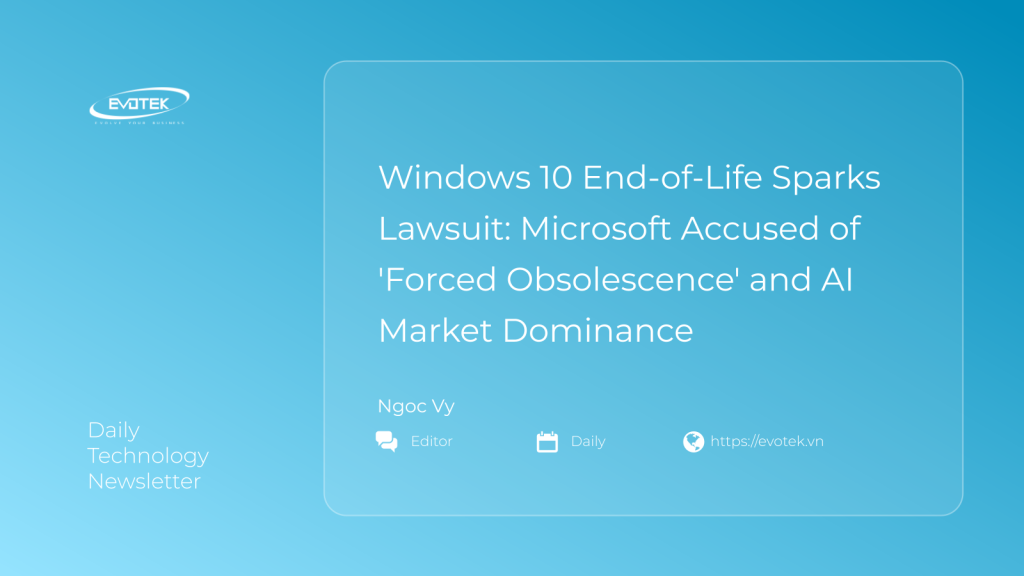Microsoft is facing legal action from a Southern California resident over its impending discontinuation of support for the widely used Windows 10 operating system. The lawsuit, filed on Thursday, August 7, 2025, alleges that the tech giant’s strategy amounts to “forced obsolescence” and is a calculated move to “monopolize the generative AI market.”
Despite the launch of Windows 11 nearly four years ago, a significant portion of the global Windows user base — estimated at a billion individuals — continues to rely on the decade-old Windows 10. According to StatCounter, approximately 43% of desktop Windows users still operate on the older version. This large segment of users now faces a critical deadline: routine support for Windows 10 is set to cease on October 14, just over two months away.
The Core of the Complaint: Obsolescence and AI Dominance
Plaintiff Lawrence Klein, who owns two laptops running Windows 10, asserts that both devices will effectively become obsolete once Microsoft ends support. His complaint, lodged in San Diego Superior Court, argues that this discontinuation is a deliberate part of Microsoft’s broader strategy to compel customers into purchasing new devices and to secure a dominant position in the rapidly evolving generative artificial intelligence market.
Windows 11 integrates Microsoft’s suite of generative AI software, including the prominent chatbot, Copilot. For optimal performance, these AI applications require a specialized component known as a neural processing unit (NPU). While newer tablets, laptops, and desktop computers are increasingly equipped with NPUs, the vast majority of older devices running Windows 10 lack this crucial hardware.
“With only three months until support ends for Windows 10, it is likely that many millions of users will not buy new devices or pay for extended support,” Klein states in his complaint. He warns of severe implications, noting that “These users — some of whom are businesses storing sensitive consumer data — will be at a heightened risk of a cyberattack or other data security incident, a reality of which Microsoft is well aware.”
Klein further elaborated on the potential ripple effect, stating, “Microsoft’s long-term business strategy to secure market dominance will have the effect of jeopardizing data security not only of Microsoft’s customers but also of persons who may not use Microsoft’s products at all.”
User Impact and Environmental Concerns
While a free upgrade to Windows 11 is available, an estimated 240 million personal computers globally do not possess the necessary hardware specifications to run the new operating system. Without ongoing security updates, these machines will become increasingly vulnerable to various forms of malware and viruses. Users facing this dilemma have the option of purchasing extended security updates, which will be available until 2028. However, this comes at a price: $30 annually for individuals, escalating to $61 per device for businesses in the first year, and potentially reaching $244 by the third year.
Beyond the immediate user impact, concerns are also rising regarding the environmental consequences. A market analyst noted in 2023 that Microsoft’s shift away from Windows 10 could lead millions of customers to discard their older devices, potentially consigning up to 240 million PCs to landfills. The analyst vividly illustrated the scale, writing, “If these were all folded laptops, stacked one on top of another, they would make a pile 600km taller than the moon.”
Plaintiff’s Demands and Microsoft’s Silence
Lawrence Klein is seeking a court order compelling Microsoft to continue providing free support for Windows 10 until the percentage of devices running the older operating system drops below 10% of total Windows users. While his complaint does not specify monetary damages for himself, it does request coverage for attorneys’ fees.
Microsoft has yet to respond to requests for comment regarding the lawsuit.

 日本語
日本語 한국어
한국어 Tiếng Việt
Tiếng Việt 简体中文
简体中文